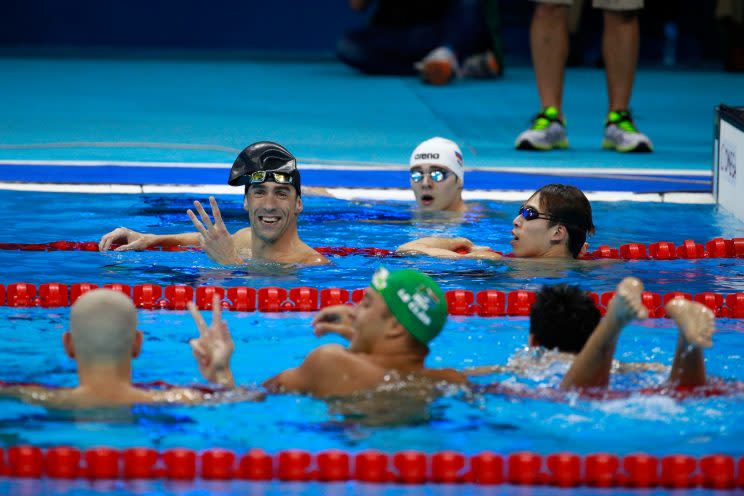Michael Phelps finishes in remarkable three-way swimming tie
Medal count | Olympic schedule | Olympic news
Joseph Schooling pulled off the upset on Friday, defeating Michael Phelps and earning the gold in the 100-meter butterfly. But what was even more remarkable was that Phelps was one of three swimmers to finish in a tie for the silver medal, joining Chad Le Clos of South Africa and Laszlo Cseh of Hungary in second place.
In an era of sports that features super slow motion and camera triangulation used to challenge tennis and volleyball faults, how can there be a tie in a race, let alone a three-way tie?
Unlike most sports, swimming doesn’t use instant replay or a photo finish to determine a winner. Instead it has an electronic timing system with touchpads on the wall of the pool that stop the clock immediately when touched.
It removes the human error of calling a race by eye and let’s the computer determine exactly who touched the wall first. In a race that comes down to millimeters, something as small as the amount of pressure used to touch the pad on the wall can make a difference.

While in track and field, ties can be broken to the ten-thousandth of a second, swimming races are called a tie if the times are equal to the hundredth of a second.
In the race immediately preceding Schooling’s victory, Maya DiRado barely edged Katinka Hosszu by a margin of 0.06 seconds. It was razor close, but somehow Phelps, Le Clos and Cseh were even closer, all finishing in 51.14 seconds.
[Related: Anthony Ervin, 35, wins 50-meter freestyle gold in stunning fashion]
Maybe three silver medals will convince FINA, the international federation for aquatics competition, to narrow their margins to thousandths of a second. But for now, it’s an unprecedented three-way swimming tie in the Olympics.

While it hasn’t happened in the Olympics, it’s not the first time it has ever happened in swimming. Last August, in a world championship 200-meter breaststroke race, three bronze medals were awarded for a three-way tie for third. Just one night before Schooling’s win, Simone Manuel of the United States and Penny Oleksiak of Canada shared gold in the 100-meter freestyle.
It could be time for swimming to narrow its tiebreaking margins, but it’s also such a rare and unlikely event that it might not matter. Weird things happen in sports sometimes and Friday gave us a tie nobody could’ve expected.



